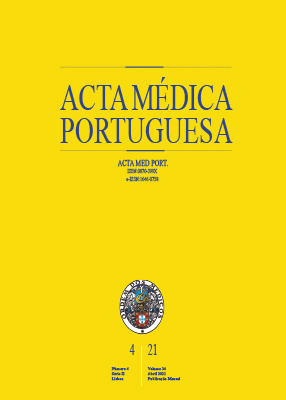Economic Crisis in Portugal: Trajectory of the Incidence of Depression and Correlation With Unemployment
DOI:
https://doi.org/10.20344/amp.13574Keywords:
Depression, Economic Recession, Portugal, Primary Health Care, Sentinel Surveillance, UnemploymentAbstract
Introduction: Previous studies have found an increase in the incidence rate of depression between 2007 – 2013 in Portugal, with a positive correlation with the unemployment rate, namely, in men. So, it was hypothesized that this increase is related with the situation of economic crisis. This study aimed to investigate if the correlation between unemployment rates and the incidence of depression is maintained in the post-crisis period of economic recovery in Portugal (2016 – 2018).
Material and Methods: An ecological study was carried out, using data from the General Practitioners Sentinel Network concerning depression incidence (first episodes and relapses) and data from the National Statistics Institute on unemployment rates in the Portuguese population. The correlation coefficient was estimated using linear regression and the results were disaggregated by sex.
Results: Between 2016 and 2018, there was a consistent decrease in the incidence of depression in both sexes. During the 1995 – 2018 period, a positive correlation was observed between unemployment and depression, with a coefficient of 0.833 (p = 0.005) in males and of 0.742 (p = 0.022) in females.
Discussion: The reduction in the incidence of depression in both sexes observed between 2016 – 2018 corroborates a positive correlation between unemployment and depression in the Portuguese population, previously observed between 2007 – 2013.
Conclusion: This study highlights the need to monitor the occurrence of mental illness in the Portuguese population, especially in moments of greatest social vulnerability in order to establish preventive measures, as a way to mitigate the impact of future economic crises.
Downloads
Downloads
Published
How to Cite
Issue
Section
License
All the articles published in the AMP are open access and comply with the requirements of funding agencies or academic institutions. The AMP is governed by the terms of the Creative Commons ‘Attribution – Non-Commercial Use - (CC-BY-NC)’ license, regarding the use by third parties.
It is the author’s responsibility to obtain approval for the reproduction of figures, tables, etc. from other publications.
Upon acceptance of an article for publication, the authors will be asked to complete the ICMJE “Copyright Liability and Copyright Sharing Statement “(http://www.actamedicaportuguesa.com/info/AMP-NormasPublicacao.pdf) and the “Declaration of Potential Conflicts of Interest” (http:// www.icmje.org/conflicts-of-interest). An e-mail will be sent to the corresponding author to acknowledge receipt of the manuscript.
After publication, the authors are authorised to make their articles available in repositories of their institutions of origin, as long as they always mention where they were published and according to the Creative Commons license.









